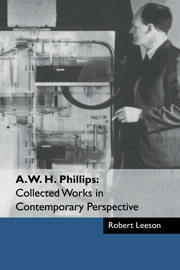Book contents
- Frontmatter
- Contents
- List of contributors
- Foreword by Arthur Brown
- Preface by Robert Leeson
- Part I Bill Phillips: Some Memories and Reflections
- Part II The Phillips Machine
- 8 The origins of the machine in a personal context
- 9 The Phillips Machine as a ‘progressive’ model
- 10 Mechanical models in economic dynamics
- 11 The history of the Phillips Machine
- 12 Early reactions to Mark I and II
- 13 A superb explanatory device
- 14 The Phillips Machine and the history of computing
- Part III Dynamic Stabilisation
- Part IV Econometrics
- References
- Index of names
- Index of subjects
8 - The origins of the machine in a personal context
Published online by Cambridge University Press: 04 May 2010
- Frontmatter
- Contents
- List of contributors
- Foreword by Arthur Brown
- Preface by Robert Leeson
- Part I Bill Phillips: Some Memories and Reflections
- Part II The Phillips Machine
- 8 The origins of the machine in a personal context
- 9 The Phillips Machine as a ‘progressive’ model
- 10 Mechanical models in economic dynamics
- 11 The history of the Phillips Machine
- 12 Early reactions to Mark I and II
- 13 A superb explanatory device
- 14 The Phillips Machine and the history of computing
- Part III Dynamic Stabilisation
- Part IV Econometrics
- References
- Index of names
- Index of subjects
Summary
Starting with a brief account of my relationship with Bill Phillips, I propose to tell the story of the origins of the machine in which I was involved with him. We first met among a group of mature ex-service undergraduates at the LSE in 1946. My subject was Economics with subsidiary courses; Bill's was Sociology with Economics as one of the subsidiary courses. I was one year ahead of him in the three-year BA course. Within this group only the barest minimum was discussed about our war experience. Even when Bill and I had developed a close personal relationship, I learnt little about his very varied career except that he had trained as an electrical engineer in New Zealand and that he had been a prisoner of war in a Japanese camp. I shared various social activities with him and I recall that at one stage these were within a quartet with two members of the company of the musical show ‘Bless the Bride’! He was also one of a small group of students (men and women) who walked the footpaths of Surrey at weekends. Bill was certainly no misogynist, nor was he a workaholic.
It gradually became clear that Bill was dissatisfied with Sociology and was becoming increasingly interested in macroeconomics. We had occasional problem-solving sessions, but it was after I had taken up an appointment to the staff of the Department of Economics at Leeds that the crucial exchange took place.
- Type
- Chapter
- Information
- Publisher: Cambridge University PressPrint publication year: 2000
- 6
- Cited by



